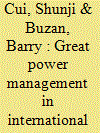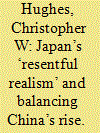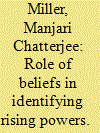|
|
|
Sort Order |
|
|
|
Items / Page
|
|
|
|
|
|
|
| Srl | Item |
| 1 |
ID:
145548


|
|
|
|
|
| Summary/Abstract |
China has frequently been depicted by some observers as an assertive rising power. However, assertiveness is neither a theoretically rigorous nor empirically useful term. The ‘assertive China’ thesis also makes a somewhat partial argument for China’s external behaviour by primarily focusing its responses on territorial disputes. A closer examination of China’s regional security strategy reveals that it is shifting from comprehensive reassurance to conditional reassurance, combined with active coercion towards specific target states. Overall, China’s strategic transition has occurred amid profound international and regional environmental changes. In particular, the rise of China has shifted the regional balance of power in China’s favour, the United States has strengthened its strategic involvement in the region, and neighbouring countries have developed substantial concerns about China’s role there. Owing to these external and internal variations, China has been more inclined in recent years to use its coercive power to persuade neighbouring countries or to ensure that they indeed treat it with respect, yet it still pursues a strategy of general reassurance to defend its rise.
|
|
|
|
|
|
|
|
|
|
|
|
|
|
|
|
| 2 |
ID:
145549


|
|
|
|
|
| Summary/Abstract |
This article is a contribution to the English School’s theory of primary institutions. It offers an historical and structural enquiry into the meaning of great power management (GPM) as a primary institution of international society as it has evolved since the 18th century. We seek to uncover the driving forces that shape this primary institution, and how they are redefining its legitimacy in the 21st century. We are particularly interested in uncovering whether and how particular conditions in international systems/societies facilitate or obstruct the operation of GPM. The article examines how system structures, both material and ideational, have set different conditions for GPM. Using the evolution from traditional to non-traditional security as a template, it sets out the main functions that have evolved for GPM. It shows how the institution has different meanings and roles at different times, and how they play into the legitimacy that GPM requires. It considers how GPM works at both regional and global levels, and concludes by looking ahead at the prospects for GPM, and opening a discussion on how to relate GPM to global governance.
|
|
|
|
|
|
|
|
|
|
|
|
|
|
|
|
| 3 |
ID:
145547


|
|
|
|
|
| Summary/Abstract |
Japan has long been regarded by mainstream International Relations theories as a status quo power intent on pursuing an immobilist international strategy towards China characterized by hedging rather than any move to active balancing. The article argues that the conditions that are thought to encourage hedging behaviour—the predictability of other states’ intentions, the malleability of intentions through engagement, domestic preferences that obviate balancing, and a favourable offence–defence balance—are now deteriorating in the case of Japan’s strategy towards China. The consequence is that evidence is mounting of Japan’s shift towards active ‘soft’ and incipient ‘hard’ balancing of China through a policy of active ‘encirclement’ of China diplomatically, the build-up of Japanese national military capabilities aimed to counter China’s access denial and power projection, and the strengthening of the US–Japan alliance. This shift has become particularly evident since the 2010 trawler incident, and the return to power in 2012 of Prime Minister Abe Shinzō. The consequences of Japan’s shifting strategy are not yet clear. Japan may be moving towards a form of ‘Resentful Realism’ that does not add new equilibrium to regional security but is actually more destabilizing and poses risks for China and the USA, especially as Japan’s own security intentions become more opaque. These conclusions, in turn, invite a reconsideration of the comfortable theoretical consensus on Japan as an eternal status quo power.
|
|
|
|
|
|
|
|
|
|
|
|
|
|
|
|
| 4 |
ID:
145550


|
|
|
|
|
| Summary/Abstract |
The concept of rising powers is central to international relations, and it is considered crucial for answering questions about war and peace. Yet the theoretical literature on rising powers is surprisingly sparse and highly contentious. One of the biggest shortcomings in this literature is that rising powers are conceptualized only in terms of their material capabilities, that is, their relative economic and military power. As a result, there is little agreement on who is a rising power, when they rose, and when they became or will become a great power. Drawing on primary and secondary sources, this article argues that rising powers are distinguished by very specific kinds of domestic beliefs. It uses two detailed cases, one historical (the United States 1898–1903) and one contemporary (China post-2002), to show that rising powers, despite different time periods, regimes, and cultures, have very particular kinds of beliefs about how to become a great power. It uses two additional mini cases, India post-2002 and Weimar Germany 1922–1933 to argue that if beliefs are not taken into account, states may be overestimated or underestimated as rising powers.
|
|
|
|
|
|
|
|
|
|
|
|
|
|
|
|
|
|
|
|
|